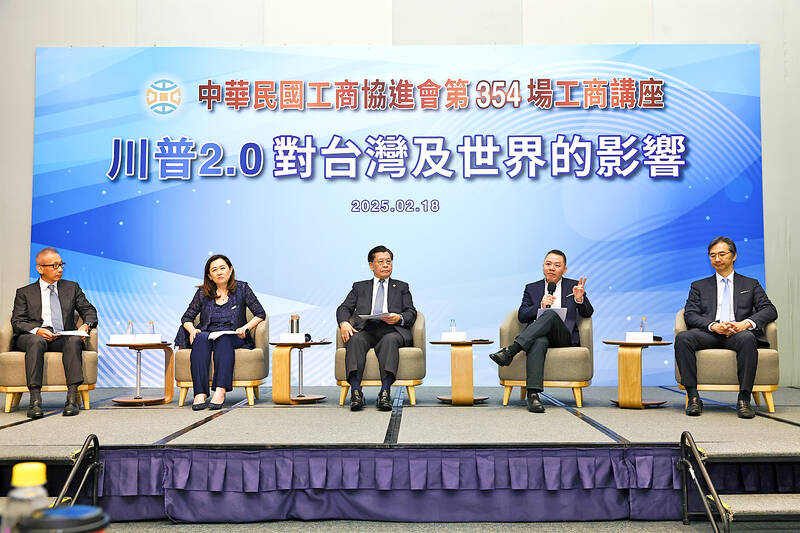Taiwan’s business leaders on Tuesday called on the government to speed up negotiations with Washington on double tax avoidance and investment protections as companies consider investment in the US to cope with tariff hikes.
The Taipei-based Chinese National Association of Industry and Commerce (CNAIC, 工商協進會) made the plea during a forum to discuss business challenges under US President Donald Trump’s second term.
“The government should create a task force to tackle semiconductor and national security, and other issues with the US, rather than leaving companies to cope with these challenges alone,” association vice chairman Huang Chiao-chang (黃教漳) said, adding that Taiwan has grown increasingly reliant on the US market.

Photo: CNA
Taiwan is the US’ sixth-largest trading partner with a trade surplus of US$73.9 billion last year, making it a potential target of tariff hikes, Huang said.
He urged the government to pursue a US-Taiwan trade agreement to reduce tax burdens on Taiwanese firms investing and operating in the US, adding that the two sides should also sign an investment protection pact to safeguard Taiwanese investments in the US.
Taiwan’s negotiators should seek tariff exemptions or tariff reductions wherever possible, he said.
In addition, the government should enhance economic, technological and innovation cooperation with the US, and help boost the competitiveness of local companies on the world stage, Huang said.
The Trump administration has announced plans to impose 25 percent tariffs on Canada and Mexico and has made known its intention to introduce “reciprocal tariffs” that could affect Taiwan’s technology, electronics and semiconductor industries.
Taiwan places a 5 percent tariff on US goods, while the US levies about 3 percent tariffs on Taiwanese imports, CNAIC standing board director Steve Pan (潘思亮) said.
If the US insists on reciprocal tariffs, Taiwan’s agricultural exports would be hit the hardest due to their thin margins, Pan said.
Trump could pressure Taiwan’s tech firms to invest in the US, which would have a greater impact, but appears inevitable in resolving the trade imbalance, he said.
The development of artificial intelligence would be a key growth driver in the US economy, which could benefit local firms in the supply chain, Pan added.
Taiwanese firms should leverage investments in the US to enhance ties with US customers, he said, adding that competitors from South Korea and elsewhere would seek to fill that void if local firms do not.

SEEKING CLARITY: Washington should not adopt measures that create uncertainties for ‘existing semiconductor investments,’ TSMC said referring to its US$165 billion in the US Taiwan Semiconductor Manufacturing Co (TSMC, 台積電) told the US that any future tariffs on Taiwanese semiconductors could reduce demand for chips and derail its pledge to increase its investment in Arizona. “New import restrictions could jeopardize current US leadership in the competitive technology industry and create uncertainties for many committed semiconductor capital projects in the US, including TSMC Arizona’s significant investment plan in Phoenix,” the chipmaker wrote in a letter to the US Department of Commerce. TSMC issued the warning in response to a solicitation for comments by the department on a possible tariff on semiconductor imports by US President Donald Trump’s

The government has launched a three-pronged strategy to attract local and international talent, aiming to position Taiwan as a new global hub following Nvidia Corp’s announcement that it has chosen Taipei as the site of its Taiwan headquarters. Nvidia cofounder and CEO Jensen Huang (黃仁勳) on Monday last week announced during his keynote speech at the Computex trade show in Taipei that the Nvidia Constellation, the company’s planned Taiwan headquarters, would be located in the Beitou-Shilin Technology Park (北投士林科技園區) in Taipei. Huang’s decision to establish a base in Taiwan is “primarily due to Taiwan’s talent pool and its strength in the semiconductor

An earnings report from semiconductor giant and artificial intelligence (AI) bellwether Nvidia Corp takes center stage for Wall Street this week, as stocks hit a speed bump of worries over US federal deficits driving up Treasury yields. US equities pulled back last week after a torrid rally, as investors turned their attention to tax and spending legislation poised to swell the US government’s US$36 trillion in debt. Long-dated US Treasury yields rose amid the fiscal worries, with the 30-year yield topping 5 percent and hitting its highest level since late 2023. Stocks were dealt another blow on Friday when US President Donald

UNCERTAINTY: Investors remain worried that trade negotiations with Washington could go poorly, given Trump’s inconsistency on tariffs in his second term, experts said The consumer confidence index this month fell for a ninth consecutive month to its lowest level in 13 months, as global trade uncertainties and tariff risks cloud Taiwan’s economic outlook, a survey released yesterday by National Central University found. The biggest decline came from the timing for stock investments, which plunged 11.82 points to 26.82, underscoring bleak investor confidence, it said. “Although the TAIEX reclaimed the 21,000-point mark after the US and China agreed to bury the hatchet for 90 days, investors remain worried that the situation would turn sour later,” said Dachrahn Wu (吳大任), director of the university’s Research Center for